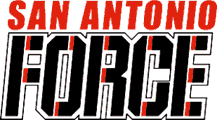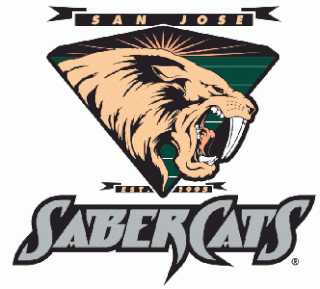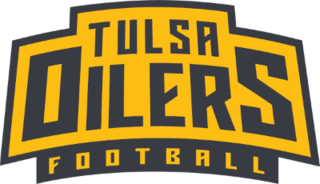
The Arena Football League (AFL) can refer to one of three successive professional indoor American football leagues in the United States. The first of these was founded in 1986, and played its first official games in the 1987 season, running for 22 consecutive seasons until going bankrupt following the 2008 season. The second league, consisting largely of teams from the first AFL and arenafootball2, purchased the first league's assets out of bankruptcy and resumed play in 2010 as a continuation of the first AFL; this second AFL ran for ten further seasons, before again going bankrupt following the 2019 season. A third AFL, which is not directly connected to previous iterations of the league but claiming their history, intends to launch in 2024.
The AF2 was the Arena Football League's developmental league; it was founded in 1999 and played its first season in 2000. Like its parent AFL, the AF2 played using the same arena football rules and style of play. League seasons ran from April through July with the postseason and ArenaCup championship in August. The AF2 continued to operate while the AFL suspended operations for its 2009 season. The league was effectively disbanded in September 2009 when no team committed to playing in 2010, but several of the stronger franchises transferred into the reconstituted AFL.

The Chicago Rush were a professional arena football team based in Rosemont, Illinois. The team played at the Allstate Arena from 2001 to 2013. They were a member of the Central Division of the National Conference of the Arena Football League (AFL). Founded in 2001, the team qualified for the playoffs 11 out of 12 seasons and won one AFL championship, ArenaBowl XX in 2006. During their history, the Rush won five divisional titles and competed in the AFL Conference Championship six times, including four consecutive appearances from 2004 to 2007. They also had the largest market in the AFL.

The New Orleans VooDoo were a professional arena football team based in New Orleans, Louisiana. The VooDoo were a member of the East Division of the American Conference of the Arena Football League (AFL). They played their home games in Smoothie King Center. The VooDoo were unrelated to an earlier AFL team, the New Orleans Night, who had competed in the 1991 and 1992 AFL seasons in the Louisiana Superdome.

The San Antonio Force were a professional arena football team based in San Antonio, Texas. The team was a member of the Arena Football League that competed in the 1992 season only. The team owner of the Force was Red McCombs. The team's colors were black, red and silver.

The San Jose SaberCats were a professional arena football team based in San Jose, California. The SaberCats had been members of the Arena Football League (AFL) since 1995 ; and until 2015, they belonged to the AFL's National Conference. Over nineteen seasons of play, the SaberCats emerged as one of the Arena Football League's most successful franchises; at the conclusion of the 2015 season, the SaberCats boasted a lifetime regular season record of 198–98. Moreover, the SaberCats had won a total of four AFL Championships. Their lifetime postseason record stood at 19–12.

The Oklahoma City Yard Dawgz were an arena football team. The team began play as a 2004 expansion team of the Arena Football League's minor league af2 before becoming a member of the AFL in 2010. Formerly a tenant of the Ford Center from 2004 until 2008, the Yard Dawgz were forced out when the National Basketball Association's Oklahoma City Thunder moved into town; starting in 2009, the Yard Dawgz played across the street at the Cox Convention Center. On October 25, 2010 Yard Dawgz owner Phil Miller announced that he decided not to play in the Arena Football League for the 2011 season.

The Macon Knights were a professional arena football team, playing in the af2 league. They were a 2001 expansion member of af2. They played their home games at Macon Coliseum. The Knights were owned and operated by Beverly Olson. The Knights were formerly coached by Derek Stingley, who was a Defensive Specialist with the Albany Firebirds in the original Arena Football League. And he also is the son of former New England Patriots' wide receiver Darryl Stingley.

The Bossier–Shreveport Battle Wings were an Arena Football League team based in Bossier City, Louisiana. They played at the CenturyTel Center in Bossier City and took their name from the metropolitan area that consists of Bossier City and neighboring city Shreveport in the Ark-La-Tex corridor. Playing in the defunct af2 from their inception in 2001 until the league's folding in 2009, the team had its best seasons in 2002, 2007, 2008, and 2009 having clinched division titles in the latter two years. They were also the only seasons in which the team had more wins than losses. In 2007, the Battle Wings clinched their first-ever playoff berth, beating the Arkansas Twisters and Rio Grande Valley Dorados before being beaten by the eventual Arena Cup champion Tulsa Talons. Despite having little success in their earlier days, the Battle Wings turned out some players who went on to appear in both the Canadian Football League and for other teams the Arena Football League, in which the team itself played for a single season after the AFL emerged from bankruptcy and resumed operations. Following the 2010 season, the team moved to New Orleans, Louisiana for the 2011 AFL season and became a successor to the New Orleans VooDoo.

The Spokane Shock were a professional indoor American football team based in Spokane, Washington, that played their home games at the Spokane Veterans Memorial Arena. The team was initially a member of arenafootball2 (af2), the Shock won division titles in all four seasons and ArenaCups in 2006 and 2009 before they joined the Arena Football League (AFL) in its 2010 relaunch. The team advanced to the playoffs three times after joining the AFL, winning ArenaBowl XXIII in their first season, making them the only arena football franchise to win both the ArenaCup and the ArenaBowl.
Donovan Morgan is an arena football wide receiver who is currently a free agent.
The Pacific Division, formerly the Central Division, was a division in the Arena Football League. The division was part of both the American and National Conferences at different points in its history. The division was first formed in 1995 when expansion teams were formed and put into the current divisions.
The 2003 AF2 season was the fourth season of the AF2. It was preceded by 2002 and succeeded by 2004. The league champions were the Tulsa Talons, who defeated the Macon Knights in ArenaCup IV. For the first time ever, AF2 uses the six-division alignment.
Jeffrey Hughley is an American football wide receiver who is currently a free agent. He was signed as an undrafted free agent by the Tulsa Talons in 2010. He finished the season with over 1,000 and 28 touchdowns as a receiver.

The 2012 Arena Football League season was the 25th season in the history of the league. The regular season began on March 9, 2012 with a game between the Pittsburgh Power and the Orlando Predators and ended on July 22, 2012 with a game between the Utah Blaze and Philadelphia Soul. The Arizona Rattlers defeated the Philadelphia Soul by a 72–54 score in ArenaBowl XXV on August 10, 2012 to conclude the playoffs.
The 2012 San Antonio Talons season was the 12th season for the franchise, and the third in the Arena Football League. This was the first season for the Talons in San Antonio, Texas after relocating from Tulsa, Oklahoma following the 2011 season. The team was coached by Lee Johnson and played their home games at the Alamodome. The Talons finished the regular season with a 14–4 record, winning the Central Division and securing the top seed in the National Conference. However, the Talons would lose at home by one point in the conference semifinals to the Utah Blaze, 34–35.
Justin Allgood is a former American football quarterback who played two seasons in the Arena Football League (AFL) with the Tulsa Talons and Philadelphia Soul. He played college football at Trinity Valley Community College and Central Oklahoma.
Jeff Jarnigan is an assistant general manager and coach for the Arizona Rattlers of the Indoor Football League (IFL).

The Tulsa Oilers are a professional indoor football team based in Tulsa, Oklahoma. A member of the Indoor Football League (IFL), the Oilers are set to begin play in 2023 at BOK Center. The Oilers are owned by Andy Scurto, owner of the ECHL franchise of the same name.










